Residential Programs for Rising 11th/12th Grade Students
Summer Residential Camps for High School Students
Each summer, the College of Engineering at NC State University offers rising 11th and 12th grade high school students the opportunity to experience engineering and get a glimpse of college life while staying on the NC State campus in Raleigh. The residential program allows students to explore a particular field of engineering in more depth while staying on campus in residential university housing.
2025 Camp Information
Rising 11th–12th Graders
Residential Camp Week 1: June 15–20, 2025
Residential Camp Week 2: June 25–30, 2025
Residential Camp Week 3: July 6–11, 2025
Residential Camp Week 4: July 13–18, 2025
NC State offers rising 11th and 12th grade students the opportunity to explore engineering and college life at NC State through our residential HS programs. Students spend a week on campus, live in university housing, eat in the dining halls, meet diverse students and immerse themselves in a specific engineering workshop of their choosing.
Typical Week at Camp
Students arrive early Sunday afternoon and are welcomed by staff with an orientation program and a camp-wide welcome dinner. Individual workshops run from 9 a.m. until 4 p.m., Monday through Thursday, with camp-wide activities in the afternoons and evenings. Friday morning, parents are invited to attend a showcase of student work, and the camp wraps up at noon on Friday.
Workshop Topics
Choosing Workshops
Students will spend their entire week at camp immersed in a particular engineering workshop. They may choose from a wide variety of topics, although note, not all topics are offered all weeks.
Please note, we are unable to accommodate workshop changes once an admissions decision has been made.
Students are encouraged to read each program description carefully so that they can choose ones that spark their interest. Providing additional workshop choices will increase the likelihood that a student is accepted as space is limited.
This summer each applicant will only be admitted to a single workshop.
AGRICULTURE ROBOTICS SYSTEMS – BIOLOGICAL AND AGRICULTURAL ENGINEERING

When is the workshop offered?
June 15 – 20, 2025
What is the workshop all about?
Robotics and automation can play an important role in society’s ability to meet the demands of agricultural production in 2050. Providing opportunities to work with faculty and student members in agricultural engineering, the camp is designed to teach engineering and math skills, as well as collaboration and teamwork. Campers will develop skills in robotic systems, electronics, and sensing technologies by simulating a fully autonomous robotic solution to a common agricultural process. Daily activities involve hands-on projects, including building, programming, and testing robotic systems.
Visit the website for more information about the Department of Biological and Agricultural Engineering.
NEW… Be in CONTROL – MECHANICAL ENGINEERING

When is the workshop offered?
TBA
What is the workshop all about?
Mechanical Engineering is the broadest of all engineering majors. It controls the engineering design of devices and processes in every scientific field. In this program, each of you will build your own electronic controller. Electronic controllers are used in devices in the medical, mechanical, textile, and in all of the other engineering fields, too. So, when you build your controller, you will be building the brains that lie within every device.
The actual controller that is inside any device is miniaturized from a prototype. Each of you will build your own prototype controller (which you keep). You’ll work in teams of three alongside NC State engineering students, who’ll guide you along the way. The controller can deliver insulin, control the speed of a spinning spindle, enable a humanoid robot to dance, or even monitor a heart for sports training.
In the workshop, you’ll insert such parts as resistors, capacitors, and op amps into the prototype board. When finished, you’ll test it out on a test fixture to make sure it properly controls the fixture’s motion. You’ll also explore the evolution of the sensor inputs and actuator outputs that controllers manipulate – from the past to the present – to imagine the future designs that are yet to exist!
BIOENERGY SYSTEMS – BIOLOGICAL AND AGRICULTURAL ENGINEERING

When is the workshop offered?
TBA
What is the workshop all about?
Biological engineering is the combined application of engineering principles and biological sciences. From molecules and microbes to large ecosystems, biological engineers design solutions to real-world problems. Working with faculty and engineering students, participants will have a hands-on research experience using current technologies. This summer program is designed to give students an understanding of the diverse topics of biological engineering while allowing them to focus on the integration of two interest areas, machine systems and bioprocess engineering.
Visit the website for more information about the Department of Biological and Agricultural Engineering.
ECOLOGICAL ENGINEERING – BIOLOGICAL AND AGRICULTURAL ENGINEERING
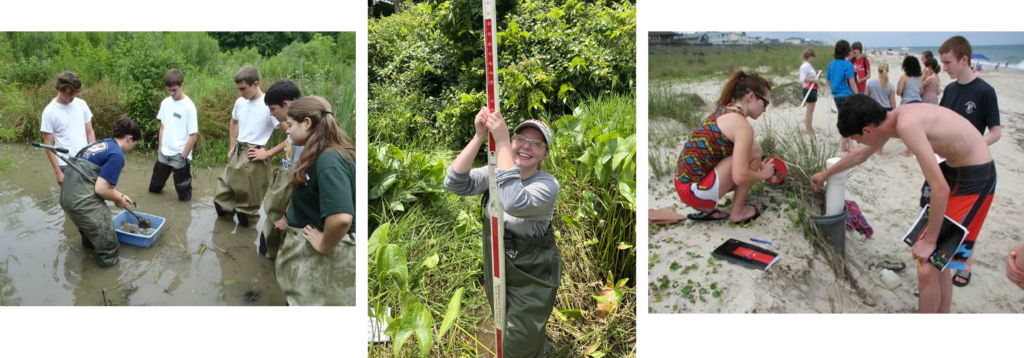
When is the workshop offered?
TBA
What is the workshop all about?
Participants in the Ecological Engineering Summer Camp Program will learn about engineering design used to improve water and air quality and enhance the sustainability of our natural resources. Participants will experience several facets of environmental and ecological engineering, including measuring the impacts of storm water treatment practices, assessing stream health and examining water flow through natural and man-made systems. This workshop includes a mix of indoor instruction and outdoor field experiences. Students should be ready to get wet and muddy tromping around in wetlands and streams! Like all fields of engineering, there are computer-aided aspects to ecological engineering. Students will learn and apply design and analysis skills.
Visit the website for more information about the Department of Biological and Agricultural Engineering.
BUILDING THE WORLD WE LIVE – CIVIL, CONSTRUCTION, AND ENVIRONMENTAL ENGINEERING
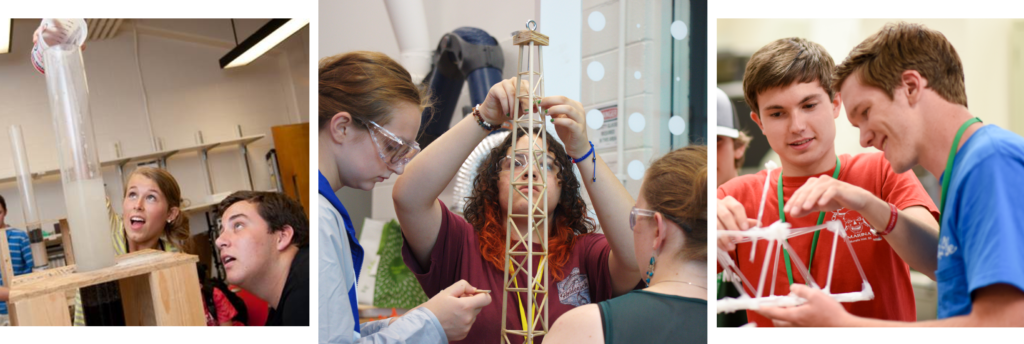
When is the workshop offered?
TBA
What is the workshop all about?
One of the major items used to measure the success of a culture or civilization involves the complexity of their buildings, structures, transportation systems and water management systems. These fundamental aspects of everyday life are the focus of the different disciplines contained within civil engineering. How do we efficiently design for natural occurrences such as floods, storms, hurricanes and earthquakes for our buildings and structures? How do we provide efficient transportation for people and products? How do we manage our water supply systems for both current and future needs? How do we build for today while preserving and protecting our environment for tomorrow? Summer camp at NC State in the Department of Civil, Construction, and Environmental Engineering will provide a variety of hands-on experiences and interactive tasks to serve as an introduction into these diverse topics that provide the basis of our civilization.
Visit the website for more information about the Department of Civil, Construction, and Environmental Engineering.
NEW… SLYTHERIN WITH PYTHON – COMPUTER SCIENCE
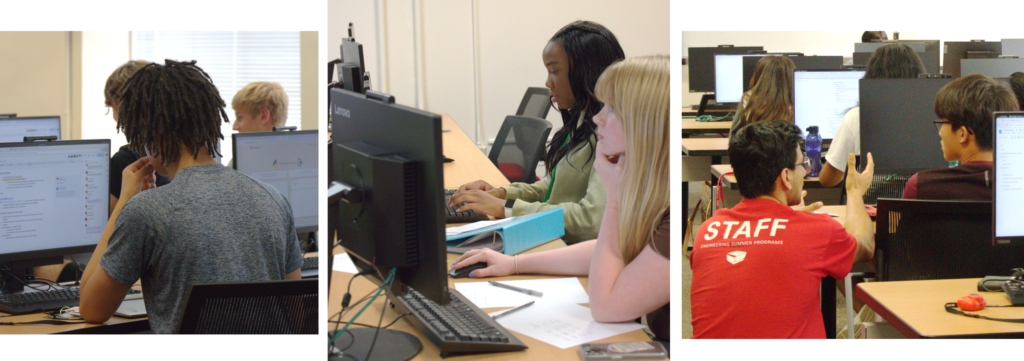
When is the workshop offered?
June 25 – 30, 2025
What is the workshop all about?
An empowering and immersive coding camp tailored for rising 11th and 12th-graders. Join us on a captivating global journey through Python programming, where each day unlocks a new destination and coding adventure inspired by diverse cultures. Guided by supportive computer science mentors, young participants will explore Python’s fascinating world, learning its language while celebrating cultural diversity through engaging projects and challenges.
This camp not only fosters coding proficiency but also encourages collaboration, creativity, and confidence-building in a welcoming and inclusive environment. By the end of this transformative week, students will emerge with a solid foundation in Python and a newfound passion for tech, ready to make their mark as innovators in the ever-evolving world of programming. This camp would be ideal for those with introductory knowledge of python!
Visit this website for more information about the Department of Computer Science.
BIOMAS TO BRILLIANCE: ENGINEERING A GREENER FUTURE – PAPER SCIENCE AND ENGINEERING
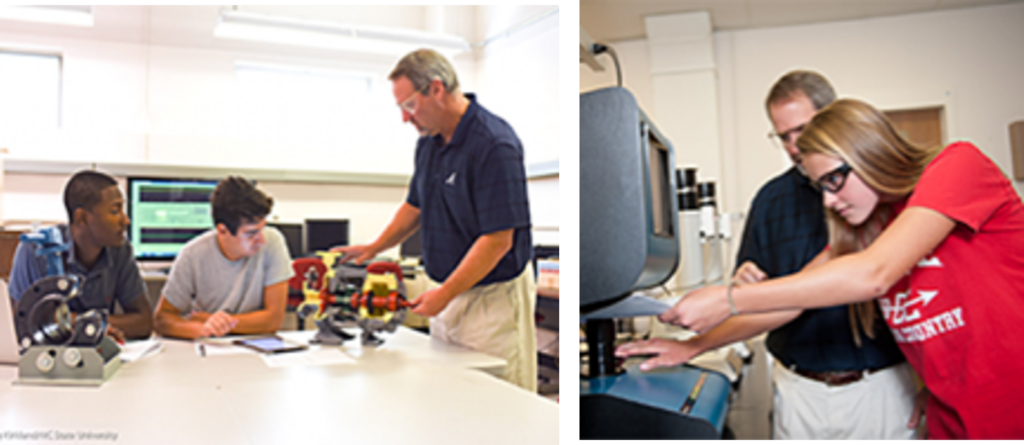
When is the workshop offered?
June 15 – 20, 2025
What is the workshop all about?
Come experience the sustainable and renewable future! In the emerging “green economy,” materials are being made out of renewable biomass instead of petrochemicals and minerals, water is being re-used and conserved efficiently and energy is being generated from renewable biofuels. The paper industry is leading the way to the green economy. Cellulose, the most predominant biomaterial, is completely renewable, sustainable and recyclable.
This workshop combines engaging presentations with exciting hands-on activities involving the creation, evaluation and life cycle of sustainable and renewable products. Examples might include generating green electrical energy and biofuels using biomass and cellulosic ethanol, working with biomaterials of the future such as printed electronics, using surface chemistry to separate ink from paper fibers when recycling paper and making bioplastics or gels using plant materials instead of oil
Campers will be asked to think critically and creatively to find solutions to the challenges facing a sustainable future.
You may think of the paper industry as ordinary, but the industry is ready to to do some extraordinary things in changing to the economy of the future! Come and learn what your future will hold in the new bio-economy!
Visit the website for more information about the Department of Forest Biomaterials (FB) in the College of Natural Resources.
devISE the solution – INDUSTRIAL AND SYSTEMS ENGINEERING

When is the workshop offered?
July 13–18, 2025
What is the workshop all about?
Do you like solving problems and making things better? As Industrial and Systems Engineers, we devise systems and products to best meet the needs of society. This can be anything from the systems that deliver your experience at Disney, meet the growing demand for healthcare, or getting your Amazon package delivered in 2 days!
We also learn to design and manufacture items from cosmetics to 3D printed hip implants! ISE puts the humans into the system and makes it all work together.
This program will provide a fun and interactive introduction to solving a wide array of problems (e.g. deliver humanitarian aid after a disaster, scale a manufacturing system for biologicals, or evaluate virtual reality for sports training). Participants will get to try their hand at designing and 3D printing, and meet some wonderful engineers along the way.
Visit this website for more information about the Department of Industrial and Systems Engineering.
Extra funding supplied through the ISE Department may be available for families in need for this camp. Apply through the financial assistance form on the online application.
ENGINEERING BETTER STUFF WITH MATERIALS SCIENCE – MATERIALS SCIENCE AND ENGINEERING

When is the workshop offered?
June 25–30, 2025
July 6–11, 2025
What is the workshop all about?
Materials are everywhere, and materials engineers are tasked with making stuff smarter, faster, stronger, cleaner, and most importantly, better! That’s why materials engineers are essential in many job fields: energy, medical devices, manufacturing, semiconductors, advanced textiles, aircraft and automotive and the list goes on. You will learn about the fundamental classes of materials such as metals, plastics, ceramics and composites in addition to cutting-edge research in nanomaterials, biomaterials, energy materials and microelectronics.
Daily activities will involve hands-on experiments including melting glass, growing bismuth crystals, examining the micro- and nanoscale of objects with electron microscopes, fracturing samples in our mechanical testing lab and freezing objects with liquid nitrogen. You will also have plenty of time to connect with fellow prospective engineers as you enjoy delicious nano-ice cream breaks.
Visit the website for more information about the Department of Materials Science and Engineering.
INTO THE INFERNO: PROTECTING OUR FIREFIGHTERS – TEXTILE ENGINEERING
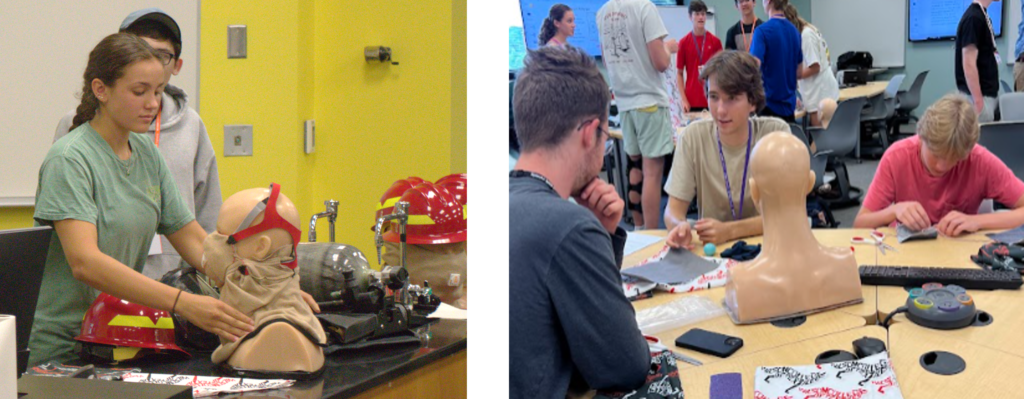
When is the workshop offered?
TBA
What is the workshop all about?
Textile engineers are equipped with the skills and knowledge to address some of our world’s biggest challenges, from safety to sustainability to healthcare.
During this week-long camp, students will create a novel textile respirator for wildland firefighter or medical responder use, gather data from its performance and revise the design through a variety of tests and wear trials within the Wilson College of Textiles. Campers will also see the impact of protective textiles and meet with firefighters at local fire stations or training centers. Through this immersive engineering program, campers will learn about the unique physical and mechanical properties of textile fibers and materials.
This camp explores groundbreaking advancements in textile engineering, showcasing how innovative materials such as high-performance fibers, flame-resistant polymers and filtration fabrics are revolutionizing protective product engineering. Campers will gain insights into the latest research, applications and real-world need for protective textiles, empowering them to make informed decisions to enhance firefighter or medical responder safety.
Join us to discover the future of protective materials and how high-performance textiles are reshaping the landscape of textile engineering.
Read the story Where Textiles Meets STEM and learn more about our B.S. in Textile Engineering!
LOOK UP! WAY UP! – AEROSPACE ENGINEERING

When is the workshop offered?
June 15–20, 2025
July 6–11, 2025
July 13–18, 2025
What is the workshop all about?
This program offers students the opportunity to learn about aeronautics, mechanical systems and electronic controls. Classroom work will include topics from airfoil and aircraft performance to structures and propulsion. Hands-on activities in the wind tunnel and building labs will reinforce concepts introduced during lectures. Experiences during the week will expose participants to the basic principles of mechanical and aerospace engineering.
Working with faculty and current engineering students, each participant will apply these basic principles to construct a model airplane, which they will fly at a local field. Other activities will include field trips to local area airports and opportunities to use flight simulator programs.
Visit the website for more information about the Department of Mechanical and Aerospace Engineering.
SEEING THROUGH A DIGITAL WORLD: COMPUTER NETWORK SIMULATION – COMPUTER SCIENCE

When is the workshop offered?
June 15–20, 2025
What is the workshop all about?
Computer networks are like the superhighways of the digital world, allowing our computers, smartphones, and other devices to talk to each other. Understanding how these networks look and work is crucial in today’s tech-driven society. That is where network simulation comes in. It is a powerful tool that lets us explore the inner workings of computer networks within a virtual and controlled environment. This means we can experiment and learn them in a digital world, making it a cost-effective and safe way to design, optimize, and comprehend complex networks.
During this camp, we will delve into how networks are created, how data flows through them in real-world scenarios, and the fundamental principles of computer networking. The ability to visualize and experiment with real network scenarios in a simulated environment allows us to grasp these complex concepts more effectively. We will also discuss how to analyze, design, and build any creative networks using a software simulator through programming. This camp covers introductory computer network and Python concepts, which is perfect for anyone with a desire to learn and a passion for creating and understanding computer networks.
THE HUMAN MACHINE: DESIGNING MEDICINE FOR THE FUTURE – BIOMEDICAL ENGINEERING

When is the workshop offered?
TBA
What is the workshop all about?
What defines your success? As biomedical engineers, we strive to improve the quality of life for patients and those who care for them through innovating medical solutions. This program will provide a crash course in the process of innovating medial solutions through an experiential learning environment including problems faced by real medical professionals, need statement development, brainstorming, prototyping and performing an investor pitch.
This multifaceted endeavor will encourage true collaboration across multiple disciplines including engineering, biology and medicine. Participants will join a team of varying interests and capabilities and dive deep into solving a real unmet medical need. No two projects will be the same and participants’ innovation will surprise both counselors and campers alike. Teams will work to develop a proof of concept prototype to impress investors and demonstrate the potential for improving patient health and quality of life.
Visit the website for more information about the Joint UNC/NC State Department of Biomedical Engineering.
WE’VE GOT THE SOLUTIONS – CHEMICAL AND BIOMOLECULAR ENGINEERING

When is the workshop offered?
July 13–18, 2025
What is the workshop all about?
Chemical and biomolecular engineers are sometimes called “universal engineers” because they are extremely versatile and able to solve a wide range of technical problems. During this camp, participants will get a big-picture view of the diverse applications of chemical and biomolecular engineering. Each day will focus on a different technology application: biotechnology, sustainability (energy and the environment), advanced materials, and entrepreneurship. In each focus area, students will participate in team-based hands-on design activities, learn about cutting-edge research going on within the department, and tour unique university facilities, including the Biomanufacturing Training and Education Center.
Visit the website for more information about the Department of Chemical and Biomolecular Engineering.
2025 Workshop Dates
| 6/15 – 6/20 | 6/25 – 6/30 | 7/6 – 7/11 | 7/13 – 7/18 | WORKSHOPS |
|---|---|---|---|---|
| X | Agriculture Robotics Systems – Biological and Agricultural Engineering | |||
| Bioenergy Systems – Biological and Agricultural Engineering | ||||
| Ecological Engineering – Biological and Agricultural Engineering | ||||
| Building the World We Live – Civil and Construction Engineering | ||||
| X | Biomass to Brilliance: Engineering a Greener Future – Paper Science and Engineering | |||
| X | X | Engineering Better Stuff with Materials Science – Materials Science and Engineering | ||
| X | devISE the solution – Industrial and Systems Engineering | |||
| X | X | X | Look Up! Way Up! – Mechanical and Aerospace Engineering | |
| X | Slytherin with Python – Computer Science | |||
| X | See Through a Virtual Box: Computer Network Simulation – Computer Science | |||
| Into the Inferno: Protecting our Firefighters – Textiles Engineering | ||||
| The Human Machine: Designing Medicine for the Future – Biomedical Engineering | ||||
| X | We’ve Got the Solutions – Chemical and Biomolecular Engineering | |||
| Be in CONTROL – Mechanical Engineering | ||||
| X | X | Vital Ventures: Sensors and Circuits for Personalized Health Monitoring – Electrical and Computer Engineering |
Camp Logistics
Camp Arrival and Departure
Check-in is from 12:00pm to 2:00 p.m. on Sunday. We will arrange to pick up any campers arriving via airplane, bus or train. It is important that campers plan on arriving prior to 2:00 p.m. so that they can attend camp orientation and the welcome dinner.
Parents are invited to attend closing ceremonies on Friday from 10 a.m. until noon. Checkout is by 1 p.m. If families are not in attendance, we can arrange for camper transportation to airports, train stations or bus depots after that.
Camp Hours
Each day begins with a breakfast in the dining hall. Workshops start at 9 a.m. and continue until 4 p.m. with an hour for lunch in one of our dining facilities. Afternoon and evening activity options are scheduled each day. Campers have the opportunity to select activities that interest them most.
Camp Location
Campers will be housed in a residence hall on campus, two to a room. No roommate requests can be accommodated. Residence counselors supervise campers during afternoon and evening activities and throughout the evening. The camper-to-counselor ratio is approximately 1:10.
Food
Students will eat breakfast, lunch and dinner in the dining halls. Dietary needs will be accommodated. Be sure to note any dietary needs in your online application.
Camp Faculty and Staff
Camp workshops will be staffed by engineering faculty members and both undergraduate and graduate engineering students. Residence counselors will supervise the students for all evening activities.
Camp Fees
- Camp Fees: $1,500
- Total amount: Due May 2, 2025
- Financial Assistance: A limited amount of financial aid may be available for families who demonstrate financial need. To be considered, a family must complete an online financial aid application.
Applying to Camp
Eligibility
All students entering 11th or 12th grade in the Fall 2025 are welcome to apply. We are unable to make exceptions for younger students. Home-schooled students are also encouraged to apply, as are students from out of state and out of the country.
Applying Online
The only way to apply is by logging in to our Summer Programs Portal, which will be available between January 13 and March 28, 2025. Please bookmark the site so you can return to it to complete your application and check on the status.
Application Components
Applicants are required to enter information into our online application tool from their high school transcripts, displaying courses and grades up through and including Fall 2024. Applicants will also be required to write responses to two questions concerning their interest in attending camp and problem solving:
- What are two goals that you would like to achieve at camp?
- What problem would you like to solve?
The submission is typed into the online application.
Admission Decisions
Admissions decisions will be based upon applicants’ academic achievements and demonstrated interest. Admitted students have typically earned A’s and B’s in math and science courses and have demonstrated a true desire to learn more about engineering. Acceptance into workshops is highly competitive. Because space is limited, you increase your likelihood of acceptance by indicating multiple workshop topics and week selections.
Application Timeline
The deadline to apply is March 28, 2025. You will be notified of acceptance on April 28, 2025.